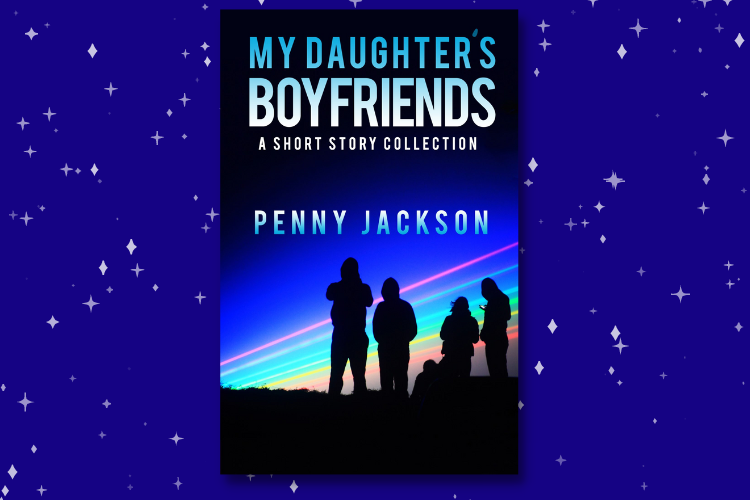
Penny Jackson on “My Daughter’s Boyfriends”
A girl living in dread of the Son of Sam, another whose father commits a terrible crime and still another who is intent on getting revenge for her mother’s rape. These are just a few of the characters in the short story collection My Daughter’s Boyfriends (Untreed Reads, $18). Author Penny Jackson, whose story by the same name won first prize in Lilith’s 2021 annual fiction contest talks to Fiction Editor Yona Zeldis McDonough about the sources of her inspiration and why she loves the short story form.
Yona Zeldis McDonough: You’ve worked in so many genres: novels, poetry, essays and playwrighting; what does the short story offer that others don’t?
Penny Jackson: Intimacy. I am the only one writing the story, and therefore perhaps I’ll dig deeper. I’m braver when writing fiction because even if something is autobiographical and painful, I can hide it by claiming this is all imagined.
Sometimes a story will appear to me in multiple genres. This was the case with my story “Directions,” that was first a story, then a play, then a screenplay that turned into a film titled Greetings From Sarajevo. But plays are limited. I can’t write a play that takes place in multiple places, but I could write a story that can be set if I wanted in six international cities.
Writing short stories was my first way to explore the world with words. I love the limit of a short story. I don’t think I could write a novel again – just too big and overwhelming.
Short stories give the writer the best of all literary words – dialogue, poetry, setting, tone, and multiple points of view. But on the other hand, you are very much alone. I am a very social person and that’s why I love being on a film set or theater with actors and directors.
Most of these stories were written during the Covid lockdown. It was my way of survival.
YZM: Coming of age is a big theme in this collection—can you elaborate on why it calls to you?
PJ: I read once that if you can survive adolescence, that’s more than enough material to write a hundred stories. I like to write “coming of age” stories because everyone was once a teenager and can relate to this theme. When you’re a teenager, you experience everything big in life for the first time: love, sex, grief, doubt, and even death. Every day is so vivid and filled with the most remarkable highs and downs. When you are in love, you are really in love. When you are miserable, you cannot imagine that there is a future. Perhaps if I had been a happier teenager, I would not be writing these stories. Now I’m grateful for all those times I felt so confused and lost. These “coming of age” stories is my own way of dealing with those emotions, even though they were experienced decades ago.
Being a teenager is so very difficult. Thank God I didn’t grow up with the Internet.
YZM: For the most part, these are New York-centric stories; how does life in the Big Apple inform and influence your work?
PJ: I was born in New York City, and attended grammar, high school, and college here. New York City is very much part of my identity. My most transformative years were the 1970s and the 1980s when I was a teenager and a young woman. I was there for the terrifying Summer of Son of Sam and the unbearably tragic AIDS epidemic, which are explored in two stories, “West End Girl” and “Prince Hal.” Since I have always lived on the Upper West Side, I very much wanted to write a story that took place in the wind-battled neighborhood of Riverside Drive. That setting is the inspiration for “Blue Moon Over Riverside.”
This collection has other settings, such as New Hampshire and Jamaica. But New York City is my muse. Even after the pandemic, where the city is now a more muted environment, I really can’t write about any other place with as much knowledge and love.
YZM: Directions is a particularly powerful story that may or may not end with a murder. What was the inspiration for this story?
PJ: During the 1990s, I volunteered to teach English to immigrants. My classroom consisted mainly of young women who had just escaped the terrible war in The Balkans. These women, young and old, had suffered terribly with the violence of that war, particularly that of systematic rape. I, along with many Americans, was just learning about these atrocities. Years later, in London, I read a news piece about a Bosnian woman who found herself living in the same neighborhood as the men who tortured her. The story fascinated me. I always wanted to explore the themes of revenge and redemption, particularly with women and war.
I deliberately left the conclusion open-ended. Can murder ever achieve absolution? This is a question I wanted my readers to explore.
YZM: Let’s talk about My Daughter’s Boyfriends, which is the title story and has an unexpected—and heartbreaking—twist. What inspired the story and its I-never-saw-coming ending?
PJ: I obviously don’t want to give away the ending, but the ending is where the story began. I read a story about a terrible thing that had happened to a famous actor I adore, and I thought, if I were this actor, how would I deal with this life altering event? Sometimes it can be very intriguing to figure out what kind of way to describe something very difficult. I found a photograph of a little boy who used to play with my daughter in nursery school and somehow saw the way the story could be told. I like stories with unique structures, and this structured narrative led me to the conclusion, which I always knew would happen.



